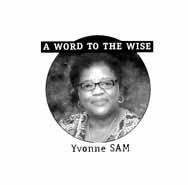
The term “minority” is part of a media language entangled in equivoques and the tortured complicated syntax that serves to unveil Quebec’s avoidance of straight talk about race relations.
Yvonne Sam
Over the course of history, Blacks have struggled (and still continue), to have the “N” word totally removed from thought, word and deed. Using one word or phrase to describe an entire group of people never fully captures the nuances of that group. True power lies in specificity.
Of noteworthy mention is the fact that the classic American novel Huckleberry Finn, written by Mark Twain in 1884, drew fire over Twain’s repeated use of the word “nigger,” which appears over 200 times in the text.
The book was deemed unbefitting for reading by schoolchildren in the American educational system. The word was eventually expunged from the classic novel and replaced by the word “slave”, although support for such a change was negligible.
Time changes, and as such things must reflect time.
The classification “visible minorities” and “minorities” have lured controversy both nationally and abroad. On the issue, the United Nations Committee on the Elimination of Racial Discrimination openly voiced their concerns to the Canadian government regarding the use of the term, on the grounds that it may be deemed offensive by certain minorities, and forthwith recommended an evaluation of this term.
In response, the Canadian government made efforts to evaluate how this term is used in Canadian society through commissioning of scholars and open workshops. The government defines “visible minority” as “persons, other than aboriginal peoples, who are non-Caucasian in race or non-white in color—a familiar and politically correct term. The word is increasingly inaccurate, as some people of color are becoming a majority.
The use of the term minority has caused us to fall into an amorphous blob of otherness, no longer existing as people and communities. I am desirous of seeing the word phased out in favor of a more people-centered approach, especially during the International Decade for People of African Descent.
Let the question be asked, “What is the meaning of the word minority? Why do we allow ourselves to be called minorities? Minority means “less than 50%,” majority means “more than 50 %.”
From a geographical standpoint, using the color white as a racial classification specifier, Whites constitute about 20% of the world’s population, then how could Blacks, Asians, and Latinos and others be seen as the minorities?
This argument may be countered by the statement that not in Quebec, but the country of Canada as a whole whites predominate, and as such the term refers to the entire nation. Wrong on all counts, as the term minority is used without any references.
The full and proper term is “member of a minority group,” but it is usually shortened to “minority.” Never is it expanded to “member of a minority group in Quebec or Canada.”
Is minority a numerical or a political term? Do the whites have disproportionate power because they see themselves, falsely, as the majority and therefore powerful and in control, projecting that power and that control into the minds of others who then automatically assume second-class status?
Another equally troubling and co-existing term is “non-white.” One wonders why is the term “non-white” always used while the term “non-black” is never even uttered. Is it due to the fact that white is somehow seen as the standard, when, in fact, there is no standard group to which all others must be compared. We are all of us equal to each other.
Furthermore, if white is “the absence of color” then “nonwhite” literally means “the absence of the absence of color” which is a double negative, standing in total violation of the rules of grammar.
Imagine for a brief moment what goes through the minds of our young children. They enter school ready and eager to learn, to soak up everything and anything that is presented to them. Over time they are led to believe, that they are “a member of a disadvantaged, nonwhite minority group.”
We must get serious enough about changing the power dynamic as well as the semantic. The “M” word is equally dangerous as the “N” word.
Canada should pay respect to the UN’s call to “reflect further” on the use of the term visible minorities.















